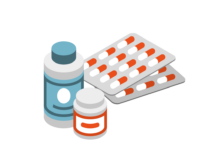By: NPS MedicineWise
Published 19 April 2018
New medicines and established medicines
For some people we spoke to, it was easier to remember to take a medicine when it was new. They were more conscious of ‘getting it right’, or they were happy to finally be receiving treatment and feeling better. However, it was easy to become complacent over time as they became accustomed to feeling well and no longer had symptoms or pain to remind them to take their medicines. In these circumstances, adding a ‘new’ or short-term medicine (such as an antibiotic for an infection) could help by triggering their memory to take all of their other usual medicines.
Interruptions to usual routines
Remembering to take medicines can be a problem when there is some interruption to usual daily life, such as holidays, running last-minute errands or going out for a meal. This is difficult for the people we spoke to who have well-established, home-based medicines routines. Oversleeping is an issue with medicines that need to be taken first thing in the morning. Busy days that make people feel unwell, tired or lose sleep mean that they may forget to take their night-time medicines.
Helpful reminders
Some medicines are easier to remember to take than others. Medicines that can be stored in plain view or can be taken ‘attached’ to usual daily routines (such as brushing teeth) are easier to remember than medicines that have to be stored out of view (such as in the refrigerator) or taken in an unusual way. One participant, for example, found it difficult to remember to remove her medication patch in the mornings, as it was applied to her back where she could not see it or remember to remove it after a full night’s sleep. Ways of storing medicines or reminders that people use do not always help them to remember.
What people do when they forget to take their medicine
What people do when they forget to take their medicines usually depends on the medicine they have forgotten to take. Some medicines can be taken as soon as they are remembered; others should not be taken until the next scheduled dose at the usual time. Many people we spoke to had asked their doctor what to do if they forget.
Strategies that help people remember to take their medicines
There are various strategies that people use to help them remember to take their medicines. Some people carry an emergency supply so that they don’t risk missing a dose: one person does this by keeping a spare strip of some of her medicines in her purse, while another keeps a small cosmetic bag with spares of all her medicines just for going out.
Alarms are helpful, particularly for medicines that are more likely to be forgotten such as those that are taken at midday. Other people set an alarm on their mobile phone, so that they are reminded to take their medicine wherever they are. Smartphone apps specifically to help with remembering medicines were also found to be extremely helpful to the people who use them.
However, reminder systems for medicines are not always foolproof; they need to be easily accommodated into a person’s normal day for them to work. For example, one person we spoke to once had a job that involved working on rooftops and he would not have his medicines with him when the phone reminder alarm rang. By the time he was back on the ground, he had forgotten all about his medicines.
Source: https://www.nps.org.au/living-with-multiple-medicines/forgetting-and-remembering
Image: https://renuerx.com/wp-content/uploads/2019/04/large-ReNue-Rx-What-Should-You-Do-When-You-Forget-To-Take-Your-Medication.jpg
Comment:
I selected this article as the information addressed accompanied by individuals that provided a video recording explaining their unique scenarios for each subsection enhances on the issue of the ‘lifestyle’ change that occurs when taking medications. Aside from the adherence to understanding the contents of the bottle, individuals have found it quite challenging to remember/incorporate their medication to ensure their health is being treated properly and with the intended care.





Josh, this is a good find as it really adds some good insight to medication, in that medication is a part of our daily life, and remembering to take it or choosing not to take it can be reasons why we don’t take it. I think it highlights the other side of the pill bottle, in that the person can read the pill bottle all day, but we need to see how the pill (or medication) is incorporated into the rhythm of their lives.